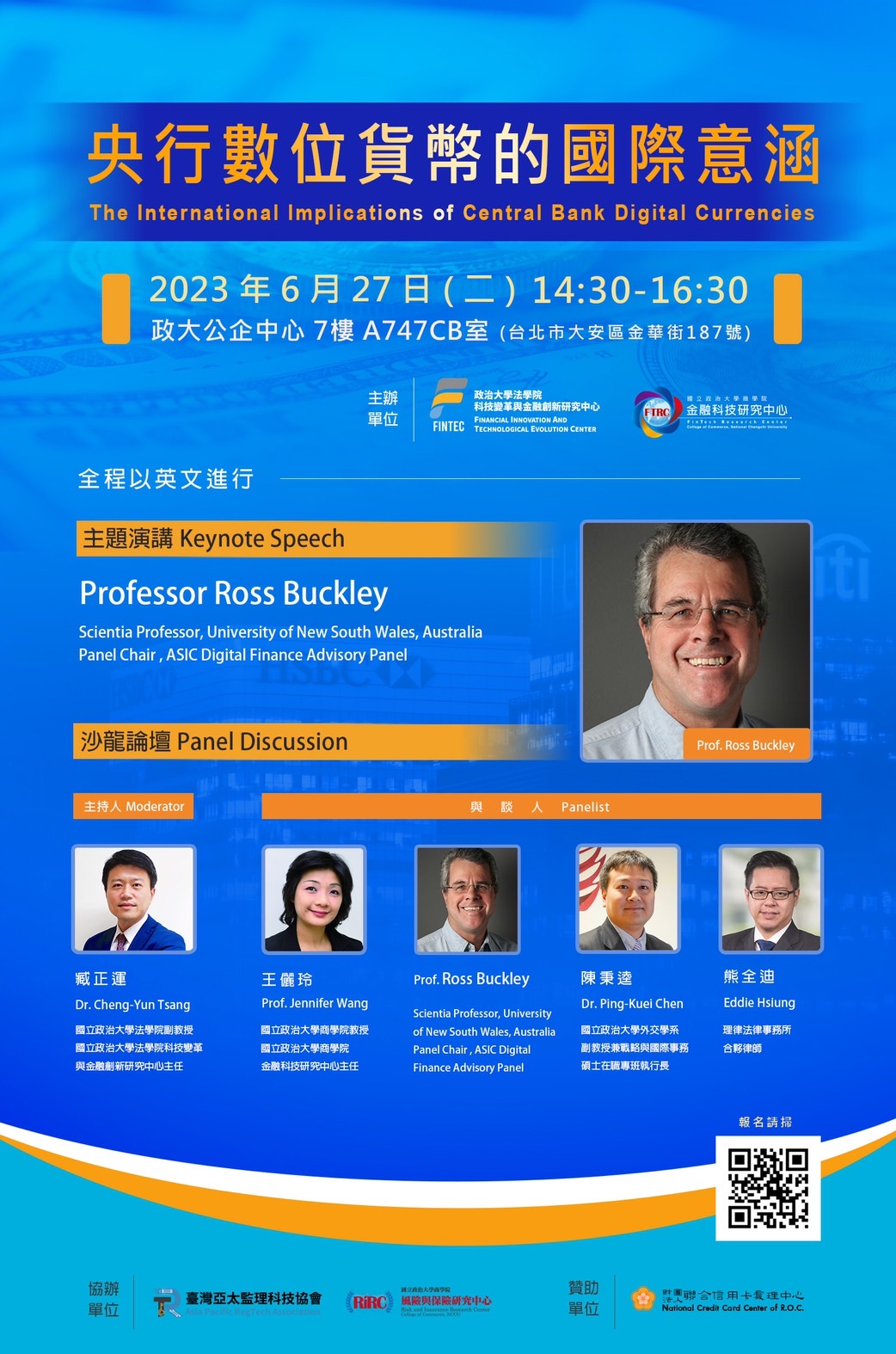According to a survey from the Bank for International Settlements and the International Monetary Fund, more than a hundred states are exploring CBDCs. Including China, the European Union and Taiwan are all making progress. We are very honored to have Scientia Professor Ross Buckley from the UNSW Sydney as the keynote speaker. Professor Buckley is one of the world’s top experts in FinTech, RegTech, Cryptocurrencies and Digital Financial Services. He also joined the panel discussion hosted by Professor Cheng-Yun Tsang, with the experts from local, including Professor Jennifer Wang, Professor Pin-Kuei Che and Attorney Eddie Hsiung.
In the keynote speech, The International Implications of Central Bank Digital Currencies, Professor Buckley described the different possibilities and the indispensability of the development of CBDC. He also shared the failure of FB’s Libra and suggested the warning. Professor Buckley introduced in detail the different stages and goals of the development of CBDC in the northern and southern hemispheres, especially the E-CNY. Because of the particularity of Chinese society, the implementation and popularization of digital currency has become easy. E-CNY is a more convenient and cheaper way for payment with a lot of other benefits to China. The development of CBDC will have huge impact on the world. CBDC is going to reduce the transaction costs, as well as exchange rate risk of international contracts. Let’s look back to the history. After the Industrial Revolution, the British Pound became the major global reserve currency but replaced by US dollar as the world’s factory after WW II. Now, the world’s factory is China, its currency status has changed. However, E-CNY needs to solve the problem of trust issue. We can expect more digital payment method to be used more in global economic activities when the CBDCs of more countries launched in the future.
After the keynote speech, As talking about the impact on global financial order and how global standard to be set, Professor Wang summarized four points: the shift for monetary control reserve currency, financial inclusion, the disruption of traditional banking, and global cross-border payment will be accelerated. Professor Chen believed mBridge is currently the most critical projects among the many BIS led. Professor Buckley suggested the agreement of the Central Banks of major countries will be the most effective way. As to the many challenges of CBDCs, Professor Wang observed the following five major challenges: the technical infrastructure, privacy protection, financial stability, legal and regulatory framework and user acceptance. Attorney Hsiung shared his view on privacy protection. As the issue of personal information leakage or theft has become more serious, cross border dispute will be more challenging. Like PBOC work with Alipay and WeChat Pay in China, Taiwan’s government should consider carefully if we will do the same thing together with the current many e-wallet companies. Professor Buckley believed that the application of CBDC will not change much for users, but the supporting structure. It associates legal change for CBDC issuance and operation. Law is the critical reason why the 11 countries have spent so many years for experimentation.
Any suggestion to Taiwan? Attorney Hsiung said currency will not become easier to be manipulated just because of digitalization. Professor Chen deduced that the development of CBDC must solve the privacy problem, the key factor for the success of CBDC is trust. Professor Wang pointed out that Taiwan currently has many priorities in financial technology, the CBDC may be a good breakthrough for Taiwan to integrate with international standards. Professor Buckley believed that Taiwan needs more research and pilot experiments to figure out its own way. Professor Tsang agreed, as Professor Buckley said, Taiwan needs to conduct more experiments with inviting more stakeholders to join and talking with more international scholars for better development.
We are grateful to our event partners ‘The FinTech Research Center of NCCU’, ‘Asia Pacific RegTech Association’, ‘The Risk and Insurance Research Center of NCCU’ and ‘National Credit Card Center, R.O.C.(NCCC)’.


